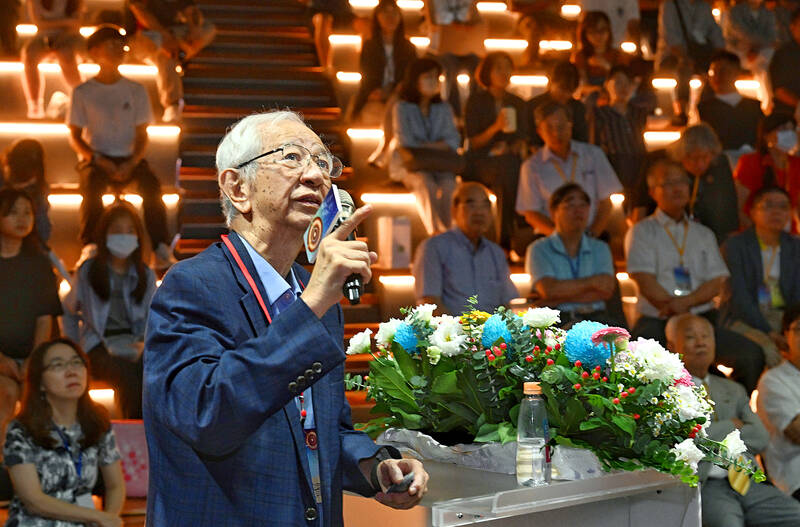Humanity must wake up to the climate crisis or face extinction, Taiwanese Nobel Prize laureate and National Climate Change Committee Adviser Lee Yuan-tseh (李遠哲) said yesterday in a call for urgency in the nation’s transition to renewable energy.
He made the remarks at a renewable energy forum at the National Taiwan Science Education Center in Taipei, saying that humans are on a path to destroying their society and the planet.
Forest fires and extreme weather events occurring globally have made it clear that humanity would face extinction if it does not wake up to the threat posed by climate change, said Lee, a former Academia Sinica president.

Photo: Lin Cheng-kun, Taipei Times
The international effort to ban chlorofluorocarbons patched the ozone hole, showing that collective action could work, he said.
Humans must reject consumerism to rediscover value in frugality, cease the mindless building of large-scale constructions that harm the environment and forge a rational social order to live in harmony with nature, he said.
“Global warming and the future of our species is what keeps me up at night,” he said, adding that global challenges require an organized global response.
Humans should find a different developmental model, improve the technology to capture and store solar energy, and share it across national lines, he said.
The UN had said global warming should be limited to 1.5°C from preindustrial levels — which the world surpassed last year, Taiwan Institute for Sustainable Energy chairman Eugene Chien (簡又新) said at the same event.
Taiwan is one of the main culprits for the global failure to contain warming within that threshold, he said.
The nation releases large amounts of carbon gases, is not self-sufficient in energy and has not built enough renewable energy resources, he said.
Taiwan reduced carbon emissions by 4.6 percent in 2023 and aims to cut emissions by 28 percent by 2028, while the UK reduced carbon emissions by 52.7 percent in 2023 and aims to cut them by 68 percent by 2050, he said.
Taiwan would likely prioritize its advantages in chipmaking and artificial intelligence development over the next 10 years, National Climate Change Committee Deputy Convener Tung Tzu-hsien (童子賢) said.
The nation must deal with its energy dependency problem by transitioning to green energy while it still can, he added.

The manufacture of the remaining 28 M1A2T Abrams tanks Taiwan purchased from the US has recently been completed, and they are expected to be delivered within the next one to two months, a source said yesterday. The Ministry of National Defense is arranging cargo ships to transport the tanks to Taiwan as soon as possible, said the source, who is familiar with the matter. The estimated arrival time ranges from late this month to early next month, the source said. The 28 Abrams tanks make up the third and final batch of a total of 108 tanks, valued at about NT$40.5 billion

Two Taiwanese prosecutors were questioned by Chinese security personnel at their hotel during a trip to China’s Henan Province this month, the Mainland Affairs Council (MAC) said yesterday. The officers had personal information on the prosecutors, including “when they were assigned to their posts, their work locations and job titles,” MAC Deputy Minister and spokesman Liang Wen-chieh (梁文傑) said. On top of asking about their agencies and positions, the officers also questioned the prosecutors about the Cross-Strait Joint Crime-Fighting and Judicial Mutual Assistance Agreement, a pact that serves as the framework for Taiwan-China cooperation on combating crime and providing judicial assistance, Liang

A group from the Taiwanese Designers in Australia association yesterday represented Taiwan at the Midsumma Pride March in Melbourne. The march, held in the St. Kilda suburb, is the city’s largest LGBTQIA+ parade and the flagship event of the annual Midsumma Festival. It attracted more than 45,000 spectators who supported the 400 groups and 10,000 marchers that participated this year, the association said. Taiwanese Designers said they organized a team to march for Taiwan this year, joining politicians, government agencies, professionals and community organizations in showing support for LGBTQIA+ people and diverse communities. As the first country in Asia to legalize same-sex

MOTIVES QUESTIONED The PLA considers Xi’s policies toward Taiwan to be driven by personal considerations rather than military assessment, the Epoch Times reports Chinese President Xi Jinping’s (習近平) latest purge of the Chinese People’s Liberation Army (PLA) leadership might have been prompted by the military’s opposition to plans of invading Taiwan, the Epoch Times said. The Chinese military opposes waging war against Taiwan by a large consensus, putting it at odds with Xi’s vision, the Falun Gong-affiliated daily said in a report on Thursday, citing anonymous sources with insight into the PLA’s inner workings. The opposition is not the opinion of a few generals, but a widely shared view among the PLA cadre, the Epoch Times cited them as saying. “Chinese forces know full well that